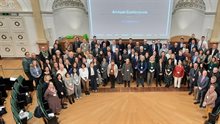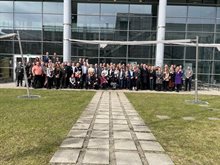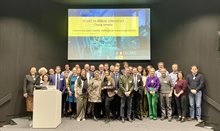Upcoming activities

Annual Conference 2025
On 11 and 12 February 2025, EECARO held its General Assembly and its third Annual Conference in the Salle Académique of the University of Liege, Belgium.
Following the presentation and review of EECARO’s 2024 activities and approval of the financials, the General Assembly organized break-out sessions to set the 2025 priorities including the continuation of the working group and its themes and the need for outreach to new members. Additionally, a concluding session was held on the top tier export control compliance challenges on intangible technology transfer (including publications and cloud-access). We ended the General Assembly with a guest speaker on ethics in dual-use research.
This EECARO annual conference was attended by more than 120 participants from EECARO members, HEECA and AEUCO representatives, and other external participants, including public authorities and policymakers. The discussions covered:
- Level-playing field of export control regulations in the EU
- Intersection between export controls and research security
- Managing defence-related research projects
- The Holy Grail of Intangible Technology Transfers
- Case studies triggering compliance questions
- Updates on U.S. guidance and enforcement for academia

Annual Conference 2024
On 26 and 27 February 2024, EECARO held its General Assembly and second Annual Conference on the premises of Fraunhofer in Munich, Germany. On 28 February, EECARO and HEECA organised a joint workshop on research security.
Next to the presentation and review of EECARO’s activities and accounts of 2023, the General Assembly also discussed the plans for 2024, the scope and role of EECARO as an organisation that deals with export controls and related issues (in particular research security), and the opportunities for and desirability of the participation of EECARO in public consultations, such as those organised by the European Commission. A session on publications was also held, based on a member survey completed by 23 members. The importance of the topic was iterated by many EECARO members, and a follow-up discussion was planned.
The EECARO conference was broadly attended by EECARO members, but also by HEECA members and other external participants, including participants from public authorities and policy makers. Topics that were discussed included new legal and policy developments in export controls and economic security, publications, hiring restrictions, internal compliance programmes and audits, and enforcement in export controls.
The joint EECARO & HEECA workshop addressed the broader topic of secure internationalisation. The workshop was split into three key sessions: 1) current challenges to ensuring research security and institutional and national/resources used to manage these challenges; 2) collaboration between the higher education and research organisation community and national and international policy makers to support and inform current and future policy developments; 3) what funding, networks, tools and resources are needed to enable effective change.

Annual Conference 2023
On January 24, 2023, EECARO launched its kick-off event at imec (Leuven, Belgium) with participation of nearly 60 representatives from European research organizations, export control authorities and similar associations from the United Kingdom and the United States of America.
Together they debated the outreach efforts, including guidance, from authorities to the research community and topics that are particularly challenging to implement for research organizations, such as technical assistance, emerging technologies, item classification, intangible technology transfers, and publications.
The discussions highlighted that the awareness about the (basics of) dual-use export controls and about the potential impact on research related activities highly varies amongst research organizations. This applies as well to the level of the implementation of internal compliance measures for export controls. Particularly interestingly were the experiences from the similar associations from the United Kingdom and the United States of America on how to organize the interactions with the research community and the relevant authorities.